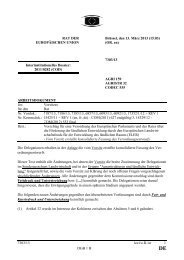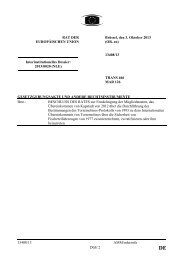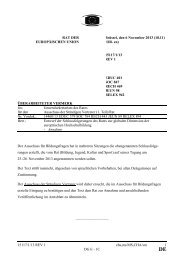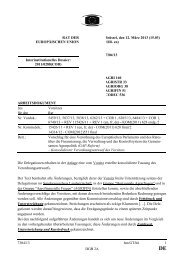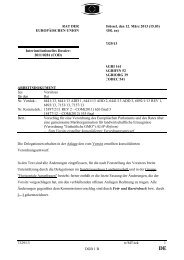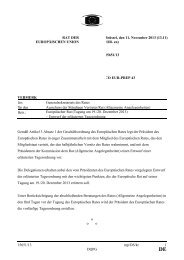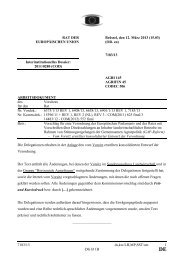9057/11 MM/ag 1 DG I - 2B COUNCIL OF THE EUROPEAN UNION ...
9057/11 MM/ag 1 DG I - 2B COUNCIL OF THE EUROPEAN UNION ...
9057/11 MM/ag 1 DG I - 2B COUNCIL OF THE EUROPEAN UNION ...
You also want an ePaper? Increase the reach of your titles
YUMPU automatically turns print PDFs into web optimized ePapers that Google loves.
<strong>COUNCIL</strong> <strong>OF</strong><br />
<strong>THE</strong> <strong>EUROPEAN</strong> <strong>UNION</strong><br />
Brussels, 19 April 20<strong>11</strong><br />
<strong>9057</strong>/<strong>11</strong><br />
CULT 27<br />
EDUC 80<br />
SOC 347<br />
COMPET 149<br />
NOTE<br />
from: Council General Secretariat<br />
to Permanent Representatives Committee (Part 1) /Council<br />
No. prev. doc 8025/<strong>11</strong> CULT 19 EDUC 56 SOC 264 COMPET <strong>11</strong>5<br />
Subject: Draft Council conclusions on the contribution of culture to the implementation of<br />
the Europe 2020 strategy<br />
- Adoption of Council conclusions<br />
The annexed draft conclusions have been prepared by the Cultural Affairs Committee over the<br />
course of a number of meetings. The text now meets with the <strong>ag</strong>reement of all delegations.<br />
The Permanent Representatives Committee is invited to confirm this <strong>ag</strong>reement and submit the text<br />
to Council for adoption and subsequent publication in the Official Journal.<br />
_________________<br />
<strong>9057</strong>/<strong>11</strong> <strong>MM</strong>/<strong>ag</strong> 1<br />
<strong>DG</strong> I - <strong>2B</strong> EN
Council conclusions on the contribution of culture<br />
to the implementation of the Europe 2020 strategy<br />
<strong>THE</strong> <strong>COUNCIL</strong> <strong>OF</strong> <strong>THE</strong> <strong>EUROPEAN</strong> <strong>UNION</strong>,<br />
HAVING REGARD TO<br />
ANNEX<br />
- the adoption by the European Council on 17 June 2010 of "Europe 2020", a strategy for jobs<br />
and smart, sustainable and inclusive growth; 1<br />
- the political background as set out in Annex to these conclusions;<br />
RECALLING<br />
- Council recommendation of 13 July 2010 on broad guidelines for the economic policies of the<br />
Member States and of the Union 2 , which in its Guideline 4 stresses the high economic<br />
potential of the cultural and creative industries (CCIs) and their role in promoting innovation;<br />
- Council conclusions on Cross fertilization between Europe 2020 fl<strong>ag</strong>ship initiatives Digital<br />
Agenda for Europe and Innovation Union 3 , highlighting the importance of cultural and<br />
creative content on-line and stressing the need to reinforce "the digitisation and dissemination<br />
of European cultural herit<strong>ag</strong>e, including through the digital library project 'Europeana'”;<br />
1 EUCO 13/1/10 REV 1.<br />
2 OJ L 191, 23.7.2010, p. 28.<br />
3 Doc. 16834/10.<br />
<strong>9057</strong>/<strong>11</strong> <strong>MM</strong>/<strong>ag</strong> 2<br />
ANNEX <strong>DG</strong> I - <strong>2B</strong> EN
- Council conclusions on Europe 2020 fl<strong>ag</strong>ship initiative Innovation Union: Accelerating the<br />
transformation of Europe through a fast changing role 4 , which recognise that the cultural and<br />
creative sectors represent an important source of technological and non-technological<br />
innovation, and that this potential must be fully unlocked;<br />
- the Commission Staff Working Document "Analysis of the consultation launched by the<br />
Green Paper on 'Unlocking the potential of cultural and creative industries'" 5 underlining that<br />
an overwhelming majority of respondents called for an important role for CCIs in the<br />
implementation of the Europe 2020 strategy and its fl<strong>ag</strong>ship initiatives;<br />
WELCOMING<br />
- the integrated guidelines for implementing the Europe 2020 strategy and its fl<strong>ag</strong>ship<br />
initiatives;<br />
WHEREAS<br />
- culture can make a significant and multidimensional contribution to the measures proposed by<br />
the Europe 2020 integrated guidelines and fl<strong>ag</strong>ship initiatives aiming at turning the EU into a<br />
smart, sustainable and inclusive economy;<br />
- in order to deliver this contribution, six priority areas for reinforced cooperation have been<br />
identified in the Council Work Plan for Culture 20<strong>11</strong>-2014 6 ;<br />
4 Doc. 17165/10.<br />
5 Doc. 8224/<strong>11</strong> - SEC(20<strong>11</strong>) 399 final.<br />
6 OJ C 325, 2.12.2010, p. 1.<br />
<strong>9057</strong>/<strong>11</strong> <strong>MM</strong>/<strong>ag</strong> 3<br />
ANNEX <strong>DG</strong> I - <strong>2B</strong> EN
- cooperation between all relevant sectors and a targeted approach at all policy levels is urgent<br />
and key to harnessing this contribution;<br />
- it is important that the governance structures of the Europe 2020 strategy are able to take into<br />
account input from the culture and creative sector;<br />
STRESSING<br />
1. Culture’s contribution to smart growth<br />
The CCIs are a major source of employment potential. In the last decade overall employment in the<br />
CCIs increased three times comparing to the employment growth in the EU economy as a whole 7 .<br />
They are also a driver for creativity and non-technological innovation throughout the economy,<br />
producing high-quality and competitive services and goods. Finally, through relevant links with<br />
education, culture can effectively contribute to the training of a skilled and adaptable workforce,<br />
thus complementing economic performance.<br />
2. Culture’s contribution to sustainable growth<br />
Culture can contribute to sustainable growth through fostering greener mobility and the use of<br />
cutting edge sustainable technologies, including digitisation which assures the on-line availability of<br />
cultural content. Artists and the cultural sector as a whole can play a crucial role in changing<br />
people's attitudes to the environment.<br />
3. Culture’s contribution to inclusive growth<br />
Culture can contribute to inclusive growth through promoting intercultural dialogue in full respect<br />
for cultural diversity. Cultural activities and programmes can strengthen social cohesion and<br />
community development as well as enable individuals or a community to fully eng<strong>ag</strong>e in the social,<br />
cultural and economic life;<br />
7 European Competitiveness Report 2010, SEC(2010) 1276 final.<br />
<strong>9057</strong>/<strong>11</strong> <strong>MM</strong>/<strong>ag</strong> 4<br />
ANNEX <strong>DG</strong> I - <strong>2B</strong> EN
INVITES MEMBER STATES TO<br />
- take into consideration the cross-cutting character of culture when formulating relevant<br />
policies and national reform programmes regarding the achievement of the targets of the<br />
Europe 2020 strategy and to share good practices in relation to the tools and methodologies to<br />
measure the contribution of culture to these targets;<br />
- strengthen the synergies and promote partnerships between education, culture, research<br />
institutions and the business sector at national, regional and local levels with special regard to<br />
talent nurturing and the skills and competences necessary for creative activities;<br />
- make use of EU financial instruments - in particular Structural Funds - to recognise the<br />
potential of culture and CCIs as drivers for development in regions and cities and, where<br />
appropriate, to integrate them into smart specialisation strategies 8 ;<br />
- encour<strong>ag</strong>e, in order to promote sustainable development, sustainable and green technologies<br />
in the processes of production and distribution of cultural goods and services and to support<br />
artists and the cultural sector in raising awareness of sustainable development issues through<br />
inter alia non-formal and informal educational activities;<br />
- explore the role of tangible and intangible cultural herit<strong>ag</strong>e in community development and in<br />
promoting active citizenship and take it into consideration when drawing up relevant local and<br />
regional development strategies;<br />
- respond to the training needs and capacity-building priorities of the specialised institutions<br />
and professionals that carry out effective socio-cultural work;<br />
- consider the capacity development needs in public cultural organisations in order to enable<br />
them to deliver suitable services, with special regard to their socio-cultural functions;<br />
8 Commission Communication of 6 October 2010 on "Regional Policy contributing to smart<br />
growth in Europe 2020" - COM (2010) 553 final.<br />
<strong>9057</strong>/<strong>11</strong> <strong>MM</strong>/<strong>ag</strong> 5<br />
ANNEX <strong>DG</strong> I - <strong>2B</strong> EN
INVITES <strong>THE</strong> CO<strong>MM</strong>ISSION TO<br />
- consider, without prejudice to the upcoming negotiations on the new multiannual financial<br />
framework, how its proposals for future EU policy and financial instruments can fully take<br />
into account the contribution of culture to the targets of the Europe 2020 strategy;<br />
- pursue the cooperation between all relevant Commission services in order to emphasise the<br />
role of culture in the implementation of the Europe 2020 strategy and ensure that it is<br />
reflected in relevant policies, guidelines and governance arrangements;<br />
INVITES <strong>THE</strong> MEMBER STATES AND <strong>THE</strong> CO<strong>MM</strong>ISSION, WITHIN <strong>THE</strong>IR RESPECTIVE<br />
COMPETENCES, TO<br />
- deploy the statistical framework being developed by ESSnet culture with a view to producing<br />
reliable, comparable and up-to-date information on the social and economic impact of culture<br />
and work on future priorities on the basis of recommendations issued by ESSnet-culture;<br />
- build upon the results contained in the Commission Staff Working Document referred to<br />
above and seize the opportunity of the European Creative Industries Alliance in order to<br />
strengthen the CCIs, in particular SMEs and micro-enterprises, and explore new ways to<br />
further increase their own innovation capacity as well as their capacity to boost innovation in<br />
other sectors;<br />
- promote the digitisation of and access to cultural herit<strong>ag</strong>e and contemporary cultural content,<br />
including audiovisual works, in particular through Europeana, thus also promoting and<br />
preserving cultural diversity and multilingualism in full respect of the copyright and related<br />
rights;<br />
<strong>9057</strong>/<strong>11</strong> <strong>MM</strong>/<strong>ag</strong> 6<br />
ANNEX <strong>DG</strong> I - <strong>2B</strong> EN
- promote sustainable cultural tourism as a driver for cohesion and economic development;<br />
- explore how to strengthen strong cultural component in lifelong learning in order to contribute<br />
to the development of key competences 9 , with a view to feeding into policy making in this<br />
field.<br />
____________________<br />
9 Key competences are defined in the Recommendation of the European Parliament and of the<br />
Council of 18 December 2006 on key competences for lifelong learning (OJ L 394,<br />
30.12.2006, p. 10).<br />
<strong>9057</strong>/<strong>11</strong> <strong>MM</strong>/<strong>ag</strong> 7<br />
ANNEX <strong>DG</strong> I - <strong>2B</strong> EN
ANNEX TO ANNEX<br />
In adopting these conclusions, the Council recalls in particular the following background:<br />
- Resolution of the Council of 16 November 2007 on a European Agenda for Culture 10 ;<br />
- Report of the ‘Comité des S<strong>ag</strong>es’: "The New Renaissance" <strong>11</strong> ;<br />
- Council conclusions on Culture as a Catalyst for Creativity and Innovation (12 May 2009) 12 ;<br />
- Council conclusions of 27 November 2009 on promoting a Creative Generation: developing<br />
the creativity and innovative capacity of children and young people through cultural<br />
expression and access to culture 13 ;<br />
- Council conclusions of 10 May 2010 on the contribution of culture to local and regional<br />
development; 14<br />
- Council conclusions of 18 November 2010 on the role of culture in combating poverty and<br />
social exclusion; 15<br />
- Presidency's conclusions at the closing of the Informal Meeting of Ministers of Culture,<br />
(Barcelona, 31 March 2010) 16 ;<br />
- Statement issued by the Presidency on the occasion of the Informal Meeting of the Ministers<br />
of Culture (Brussels, 7 October 2010) 17 ;<br />
- Presidency statement from the informal meeting of Ministers responsible for culture (Gödöllı,<br />
Hungary, 28 March 20<strong>11</strong>).<br />
_________________<br />
10<br />
OJ C 287, 29.<strong>11</strong>.2007, p. 1.<br />
<strong>11</strong><br />
http://ec.europa.eu/information_society/activities/digital_libraries/doc/<br />
reflection_group/final-report-cdS3.pdf and its annexes<br />
http://ec.europa.eu/information_society/activities/digital_libraries/index_en.htm<br />
12<br />
8175/1/09 REV 1.<br />
13<br />
OJ C 301, <strong>11</strong>.12.2009, p. 9.<br />
14<br />
OJ C 135, 26.5.2010, p. 15.<br />
15<br />
OJ C 324, 1.12.2010, p. 16.<br />
16<br />
http://www.eu2010.es/export/sites/presidencia/comun/descargas/Ministerios/<br />
en_conclusiones_rim_cultura.pdf<br />
17<br />
http://www.culture.be/fileadmin/sites/culture/upload/culture_super_editor/<br />
culture_editor/documents/Relations_IntNat/7_octobre_2010_Reunion_informelle_des_Minist<br />
res_de_la_Culture_Declaration_de_la_Presidence_EN_final_2_.pdf<br />
<strong>9057</strong>/<strong>11</strong> <strong>MM</strong>/<strong>ag</strong> 8<br />
ANNEX TO ANNEX <strong>DG</strong> I - <strong>2B</strong> EN








